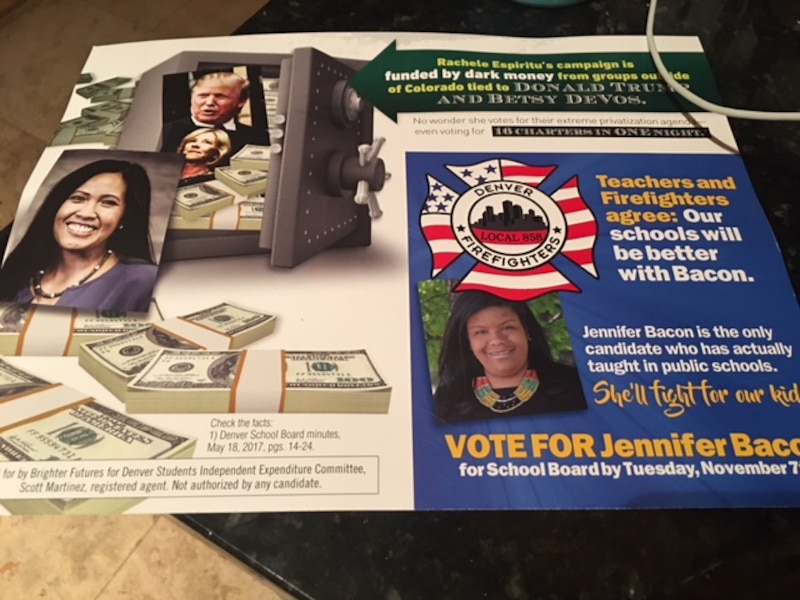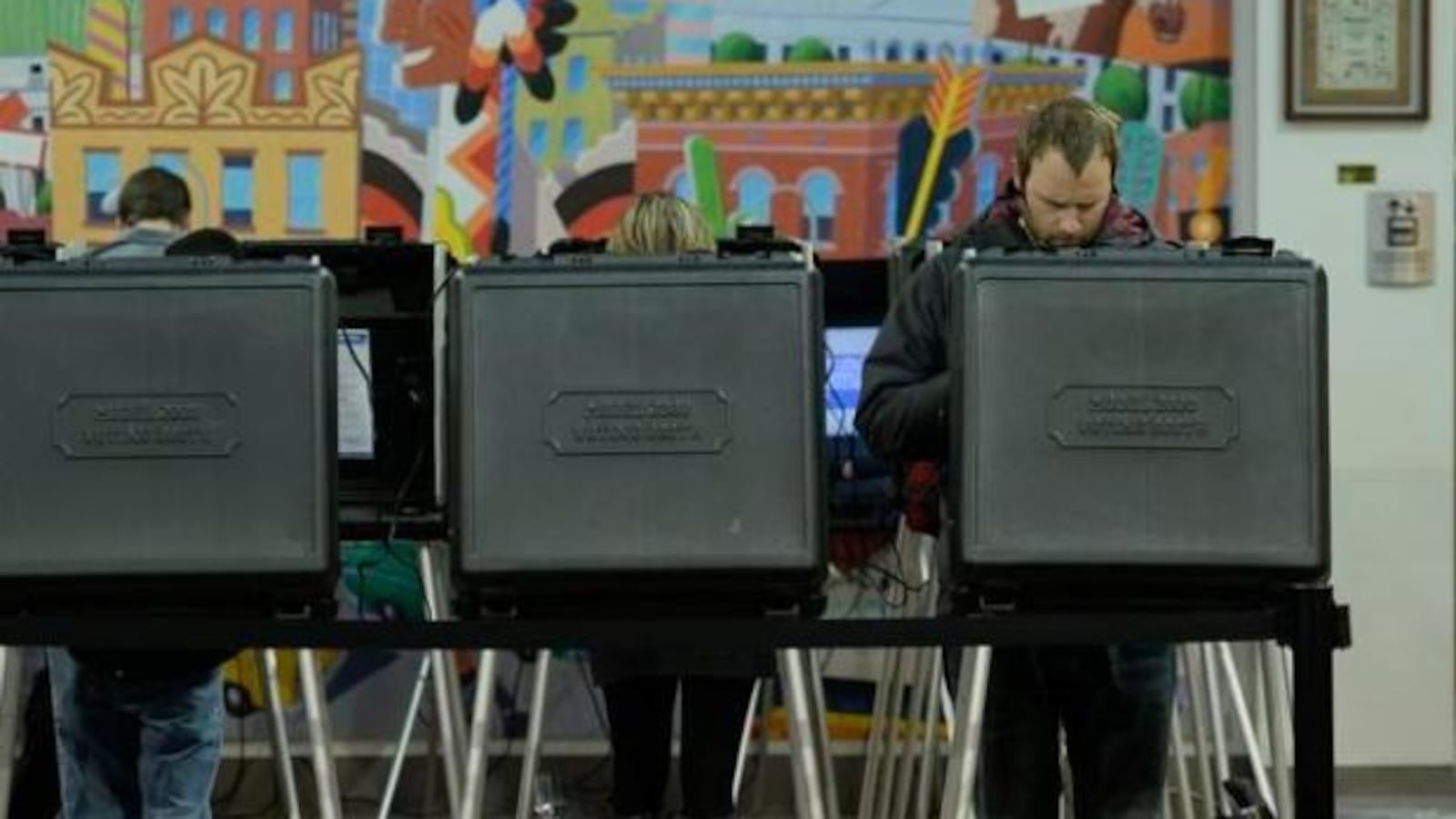The Denver school board election has grown more contentious in its waning days, with accusations flying about the influence of outside money and attempts to tie candidates who back the district’s agenda to unpopular Republicans.
Although past Denver school board races have been marked by rancor, observers and participants alike agree that the tone this year is different — closer in tenor to the heated 2015 Jeffco school board recall and this year’s divisive Douglas County school board race.
Several factors are at play: the controversial tenure of U.S. Education Secretary Betsy DeVos, long-simmering divides within the Democratic party over education policy, a more aggressive teachers union, and the growing influence of outside groups responsible for a torrent of mailers and digital advertising that can prove powerful in low-turnout elections.
At stake is control of a board that is 7-0 lockstep in support of Denver Public Schools’ strategies, which include offering families a choice among different schools including charter schools, rating schools with a system that heavily weights student progress on standardized tests, and closing schools that are persistently low-performing.
Four of the board’s seven seats are in play this election. Opponents of the district’s current path are running for all four seats. Mail ballots went out more than two weeks ago, and voting ends Tuesday on Election Day.
For several years now, school boards have been battlegrounds for factions trying to get a foothold on local politics and influence how public schools run, said Robert Preuhs, an associate professor of political science at Metropolitan State University of Denver.
“Those things continue to play out now and may be more amplified or feel more amplified because of this extra dose of polarization we’ve seen post-2016 election,” he said.
Denver’s school board campaigns have grown more sophisticated and expensive, setting the stage for more combativeness when the conditions are right.
While candidates themselves raise varying amounts of money, independent groups that are prohibited from coordinating with the candidates have emerged as big players. Both teachers unions and supporters of education reform are backing such efforts in Denver.
The biggest money player in Denver is Raising Colorado, an independent expenditure committee. On the scene since 2014, the group is connected to a web of organizations that includes Democrats for Education Reform, a political action committee with a Colorado office.
This election cycle, Raising Colorado has spent more than $350,000 to support maintaining the 7-0 margin on the DPS board, according to the recent campaign filings. The sole contributor to the committee this year: New York-based Education Reform Now Advocacy.
The organization carries out both non-political and political activity. However, as a 501(c)4 tax-exempt social welfare organization that is not a private foundation, Education Reform Now Advocacy is not required to publicly disclose its donors — and it does not. The group has contributed about $2 million to Raising Colorado since its founding.
“It could be $2 million coming from one person,” said Carol Burris, executive director of the Network for Public Education, which was formed as a counterweight to education reform groups, opposes charter schools and using test scores to evaluate teachers, and is affiliated with a 501(c)4 group that endorses candidates. “You have no idea who is giving to campaigns and what their vested interests might be.”
Robert Speth, a candidate in the Denver at-large race seeking to unseat incumbent Barbara O’Brien, has spoken out about the vast sums coming into the race, which he describes as coming from “out-of-state hedge fund managers.”
“I don’t feel like Denver is actually in control of its political outcomes at this time, and it’s really disturbing,” Speth said.
The privacy veil for donors is in a statutory rule that dates to litigation in the 1950s and 1960s, when a Alabama state investigating committee was seeking names of members of the NAACP, said Marcus Owens, a Washington lawyer and former director of the IRS’s tax exempt division.
The U.S. Supreme Court ruled that members’ names did not need to be released because of the likelihood of retaliation. Now, 501(c)4 groups at “both ends of the political spectrum make use of that non-disclosure of donors,” Owens said.
Jen Walmer, the registered agent for Raising Colorado and Colorado state director of Democrats for Education Reform, has said the independent expenditure committee and all its affiliates are in full compliance with IRS regulations.
While outside money is not new in Denver school board races, this year has brought more attention to the tone and content of some of the election messaging it’s buying.
Two independent committees bankrolled with money from local and state teachers unions have produced mailers that try to portray supporters of DPS’s current direction as allies of President Donald Trump and Education Secretary DeVos, hugely unpopular figures in Denver.
One candidate targeted in the mailers, Angela Cobián, a former teacher and community organizer and the daughter of Mexican immigrants, assailed the attempt as a baseless attack on her identity, and an editorial in The Denver Post this week denounced the tactics.
The committee responsible for the mailers, called Every Student Succeeds, is supporting Cobián’s opponent, Xóchitl “Sochi” Gaytán.
Gaytán released a statement this week urging limits on contributions to local school board elections, calling the contributions “outrageous.” She said that she “did not approve of any independent expenditure committee literature or mailers,” and that her campaign mailers have focused on her platform. Gaytán has not responded to requests for an interview on the issue.
Here is a similar piece that landed last weekend in northeast Denver, where a three-person race is considered the most competitive and hard-fought among the four contested:

The committees behind the Trump-themed ads share the same political consultant: Steve Welchert, a seasoned Democratic strategist who said he has helmed eight DPS school board candidate campaigns in addition to his independent committee work.
Welchert defended the mailers’ tone and content. “I am comfortable with everything we have done with this campaign and will continue to be comfortable with it moving forward,” he said.
Colorado Education Association and Denver Classroom Teachers Association officials have declined interview requests to discuss the mailers and the recent tenor of the campaign. The committees are funded by union members who choose to contribute to such political efforts.
Candidates being targeted by the mailers and their allies are speaking out forcefully.
School board member and longtime civic leader Happy Haynes, who is not up for reelection this year, said the tactics are “dragging this school board race that should be about our best down into the gutter … The irony is that these are Trump-like tactics if ever there was.”
Rachele Espiritu, an appointed incumbent targeted by the more recent Trump-themed mailer, said she was extremely frustrated by the mailers given her numerous public statements in support of young immigrants and against the Trump and DeVos agenda.
“I’m disappointed these fliers continue to come out against me like this, and that my opponent hasn’t even taken a stance against them,” Espiritu said earlier this week. “To me, her silence is that she is confirming these messages. The negative campaigning takes away from the issues of our students, and that is frustrating to me.”
That opponent is Jennifer Bacon, whose candidacy the committee behind the mailer is supporting. Told of Espiritu’s comments, Bacon said Thursday that she is disappointed by the election’s negativity and that she has focused on running a positive, issues-based campaign.
“I believe people are allowed to have their opinions and voting is an expression of their own positions and research,” she said. “I’m not going to be in a place where I can speak for others and check everything everyone is saying right now.”
Most of Raising Colorado’s mailers have been in support of candidates, including several that have portrayed backers of the district’s agenda as strong voices fighting Trump and DeVos. Campaign finance reports show the group also paid for a mailer in opposition to Bacon.
Espiritu, too, voiced a desire to work on limiting contributions in school board elections. She also said she was excited to get support from different groups and individuals. That includes the backing her candidacy is getting from the Democrats for Education Reform affiliates.
“I don’t think there is really anything for folks to hide,” she said. “I have looked at the DFER website and their values and vision, and I think they are commendable and are things I stand by. Whoever is supporting them, I think they can stand tall knowing they are supporting a great organization that is leading the way to help our students get the best public education they can.”
Editor’s note: This story has been updated to clarify background about the Network for Public Education.

